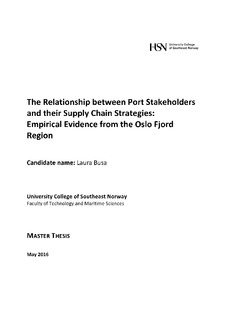The Relationship between Port Stakeholders and their Supply Chain Strategies: Empirical Evidence from the Oslo Fjord Region
Master thesis
Permanent lenke
http://hdl.handle.net/11250/2421814Utgivelsesdato
2016Metadata
Vis full innførselSamlinger
Sammendrag
Purpose: The purpose of this thesis is to investigate the choice and the effect of port stakeholders’ supply chain strategies and their effect on port performance. Design/methodology/approach: In this study, a qualitative research methodology is applied. Semi-structured interviews were conducted to collect data from various port stakeholders (located in the Oslo Fjord region). The collected data was analyzed by using NVivo software. Findings: The findings of this study illustrate various port stakeholders’ objectives and constraints related to the facilitation of corresponding supply chains. Once those factors are recognized, the supply chain strategies for port stakeholders are identified - port authorities apply lean or leagile supply chain strategy, port operators tends towards leagile supply chain strategy and port users employ agile supply chain strategy. Additionally, various port stakeholders’ perceptions on how their supply chain strategies are contributing to the port performance – as improvements in efficiency and responsiveness - are acknowledged. Contribution: This thesis contributes to knowledge creation of port authorities’, port operators’ and port users’ supply chain strategies, while considering the impact on port performance. Originality: This thesis strengthens empirical literature of Oslo Fjord port sector.
